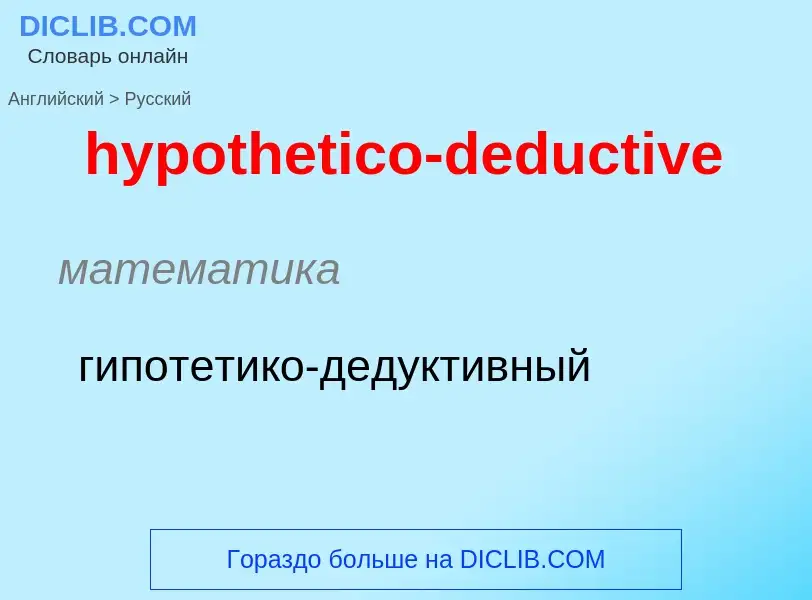Μετάφραση και ανάλυση λέξεων από την τεχνητή νοημοσύνη ChatGPT
Σε αυτήν τη σελίδα μπορείτε να λάβετε μια λεπτομερή ανάλυση μιας λέξης ή μιας φράσης, η οποία δημιουργήθηκε χρησιμοποιώντας το ChatGPT, την καλύτερη τεχνολογία τεχνητής νοημοσύνης μέχρι σήμερα:
- πώς χρησιμοποιείται η λέξη
- συχνότητα χρήσης
- χρησιμοποιείται πιο συχνά στον προφορικό ή γραπτό λόγο
- επιλογές μετάφρασης λέξεων
- παραδείγματα χρήσης (πολλές φράσεις με μετάφραση)
- ετυμολογία
hypothetico-deductive - translation to ρωσικά
математика
гипотетико-дедуктивный
общая лексика
дедуктивные рассуждения, дедуктивный вывод
метод, используемый в языке Prolog для нахождения решения по заданным фактам и правилам
математика
дедуктивное рассуждение
Ορισμός
Βικιπαίδεια
Deductive reasoning is the mental process of drawing deductive inferences. An inference is deductively valid if its conclusion follows logically from its premises, i.e. if it is impossible for the premises to be true and the conclusion to be false.
For example, the inference from the premises "all men are mortal" and "Socrates is a man" to the conclusion "Socrates is mortal" is deductively valid. An argument is sound if it is valid and all its premises are true. Some theorists define deduction in terms of the intentions of the author: they have to intend for the premises to offer deductive support to the conclusion. With the help of this modification, it is possible to distinguish valid from invalid deductive reasoning: it is invalid if the author's belief about the deductive support is false, but even invalid deductive reasoning is a form of deductive reasoning.
Psychology is interested in deductive reasoning as a psychological process, i.e. how people actually draw inferences. Logic, on the other hand, focuses on the deductive relation of logical consequence between the premises and the conclusion or how people should draw inferences. There are different ways of conceptualizing this relation. According to the semantic approach, an argument is deductively valid if and only if there is no possible interpretation of this argument where its premises are true and its conclusion is false. The syntactic approach, on the other hand, holds that an argument is deductively valid if and only if its conclusion can be deduced from its premises using a valid rule of inference. A rule of inference is a schema of drawing a conclusion from a set of premises based only on their logical form. There are various rules of inference, like the modus ponens and the modus tollens. Invalid deductive arguments, which do not follow a rule of inference, are called formal fallacies. Rules of inference are definitory rules and contrast to strategic rules, which specify what inferences one needs to draw in order to arrive at an intended conclusion. Deductive reasoning contrasts with non-deductive or ampliative reasoning. For ampliative arguments, like inductive or abductive arguments, the premises offer weaker support to their conclusion: they make it more likely but they do not guarantee its truth. They make up for this drawback by being able to provide genuinely new information not already found in the premises, unlike deductive arguments.
Cognitive psychology investigates the mental processes responsible for deductive reasoning. One of its topics concerns the factors determining whether people draw valid or invalid deductive inferences. One factor is the form of the argument: for example, people are more successful for arguments of the form modus ponens than for modus tollens. Another is the content of the arguments: people are more likely to believe that an argument is valid if the claim made in its conclusion is plausible. A general finding is that people tend to perform better for realistic and concrete cases than for abstract cases. Psychological theories of deductive reasoning aim to explain these findings by providing an account of the underlying psychological processes. Mental logic theories hold that deductive reasoning is a language-like process that happens through the manipulation of representations using rules of inference. Mental model theories, on the other hand, claim that deductive reasoning involves models of possible states of the world without the medium of language or rules of inference. According to dual-process theories of reasoning, there are two qualitatively different cognitive systems responsible for reasoning.
The problem of deductive reasoning is relevant to various fields and issues. Epistemology tries to understand how justification is transferred from the belief in the premises to the belief in the conclusion in the process of deductive reasoning. Probability logic studies how the probability of the premises of an inference affects the probability of its conclusion. The controversial thesis of deductivism denies that there are other correct forms of inference besides deduction. Natural deduction is a type of proof system based on simple and self-evident rules of inference. In philosophy, the geometrical method is a way of philosophizing that starts from a small set of self-evident axioms and tries to build a comprehensive logical system using deductive reasoning.

